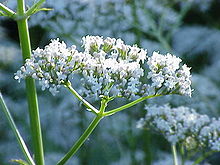 The herb valerian – often called ‘nature’s Valium’ – is a popular natural treatment in Europe, North America and Japan for insomnia and anxiety.
The herb valerian – often called ‘nature’s Valium’ – is a popular natural treatment in Europe, North America and Japan for insomnia and anxiety.
The plant has been used as a medicinal herb since at least the time of ancient Greece and Rome, says the National Institutes of Health (NIH) in USA. Hippocrates described its therapeutic properties, and later the Roman philosopher Galen prescribed valerian for insomnia (sleeplessness).
How well does valerian work? Clinical studies have had mixed results, although a number of health experts say it can help treat insomnia.
What is valerian?
What is valerian used for?
How well does valerian work?
Does valerian have any side effects?
How safe is valerian?
Who should avoid taking or be cautious about taking valerian?
Summary
What is valerian?
Valerian is a plant native to Europe and Asia that now grows in many parts of the world.
Valerian’s roots and stems are used to make capsules, tablets, teas and liquid extracts.
What is valerian used for?
Over the years valerian has been used to treat many problems, such as:
- insomnia – main current use
- anxiety
- depression
- tension and stress
- restlessness
- nervousness
- headaches
- irregular heartbeat
- period pain
- digestive problems, such as gut pain and gut spasms
How well does valerian work?
The NIH says the evidence from clinical studies of how good valerian is at treating sleep problems, such as insomnia, is inconclusive. Studies have shown that parts of valerian can sedate (calm and promote sleep) in animals.
According to MedlinePlus there is unclear scientific evidence for the use of valerian for anxiety, depression, insomnia, menopausal symptoms and sedation.
The ABC reports that lecturer in herbal medicine, Sue Evans, says that in regards to valerian’s effect on sleep:
“It’s useful for many people but in chronic insomnia it shouldn’t be taken daily – instead see a practitioner to determine underlying causes.”
The ABC also states that Director of respiratory and sleep medicine at Melbourne’s Austin Health, Professor Rob Pierce, says valerian’s sedative properties might make it helpful for mild sleep problems, but it’s no good for serious insomnia.
“Results in insomnia studies are mixed – some show small effects, some are not well designed, but the best ones show it’s no better than placebo.”
The NIH says:
“Research suggests that valerian may be helpful for insomnia, but there is not enough evidence from well-designed studies to confirm this.
There is not enough scientific evidence to determine whether valerian works for anxiety or for other conditions, such as depression and headaches.
Recent NCCAM-funded research on valerian includes studies on the herb’s effects on sleep in healthy older adults and in people with Parkinson’s disease.”
Does valerian have any side effects?
Valerian can have side effects, such as:
- blurred vision
- change in heartbeat
- headaches
- dizziness
- tiredness the morning after its use
- gut problems
- dark urine (rare)
- stomach pain (rare)
Herbal medicine expert Kitty Campion says very large doses of valerian can cause:
- bad headaches
- mental agitation
- stupor
- a feeling of heaviness
- some people to feel excited, instead of calmer, even in normal doses
See a doctor if any side effects persist or worsen.
How safe is valerian?
The ABC says studies suggest valerian is generally safe to use short term (four to six weeks). Medicine.Net.com, however, warns that valerian should not be taken for more than two weeks.
No information is available about the long-term safety of valerian, according to the NIH.
Who should avoid taking or be cautious about taking valerian?
The NIH says children under 3 years old should not take valerian because the risks to them are not known.
Pregnant women and nursing mothers should only take valerian under medical advice. This is because of the lack of studies of how safe the herb is to the fetus or infant.
Valerian can make people drowsy, so if you take it, extra care is needed when driving or using machinery.
The herb might combine with alcohol to cause people to feel too sleepy.
MedicineNet.com says before taking valerian, tell your doctor or pharmacist all prescription and nonprescription medications you are taking, as they might interact with the herb to cause health problems, especially:
- anti-anxiety drugs, such as diazepam
- antihistamines that cause drowsiness, such as diphenhydramine
- anti-seizure drugs
- medicine for sleep
- muscle relaxants
- narcotic pain relievers, such as codeine
- psychiatric medicines
- sedatives
- tranquilizers
Check all nonprescription medicine labels carefully, especially cough-and-cold mixtures. This is because many contain antihistamines, such as diphenhydramine.
Ask your pharmacist if you are unsure.
Summary
Valerian is a herb that has been used for thousands of years for treating various health problems, such as insomnia. Clinical studies of how effective it is are inconclusive, although some health professionals say valerian is helpful. The herb can have side effects, and some people should not take it or be cautious about taking it. Valerian might interact with some medicines.
written by Nyomi Graef
References:
Campion, K, 1985, Kitty Campion’s Handbook of Herbal Health, London, UK: Leopard
Carter, H, 2008, Valerian, ABC Health and Wellbeing,
http://www.abc.net.au/health/healthyliving/naturalhealth/guide/stories/2008/05/20/2230741.htm#.UFlzalH_kTA
Fraser, K, 1995, Positive Health with Herbs: The Complete Guide to Herbal Medicine, Mona Vale, Australia: All Type and Art
Somerville, R, (Ed.), 1997, The Alternative Advisor, Virginia, USA: Time-Life Books
Valerian, 2006, National Center for Complementary and Alternative Medicine, National Institutes of Health,
http://nccam.nih.gov/health/valerian
Valerian, 2008, Office of Dietary Supplements, National Institutes of Health,
http://ods.od.nih.gov/factsheets/Valerian-HealthProfessional/
Valerian, 2010, MedlinePlus,
http://www.nlm.nih.gov/medlineplus/druginfo/natural/870.html
Valerian (herb), 2010, Wikipedia,
http://en.wikipedia.org/wiki/Valerian_%28herb%29
Valerian (valeriana officinalis) – oral, 2010, MedicineNet.com,
http://www.medicinenet.com/valerian_valeriana_officinalis-oral/article.htm

 March 17th, 2010
March 17th, 2010  Nyomi Graef
Nyomi Graef  Posted in
Posted in  Tags:
Tags: 

extrahappiness.com.au’s done it once more! Incredible article!